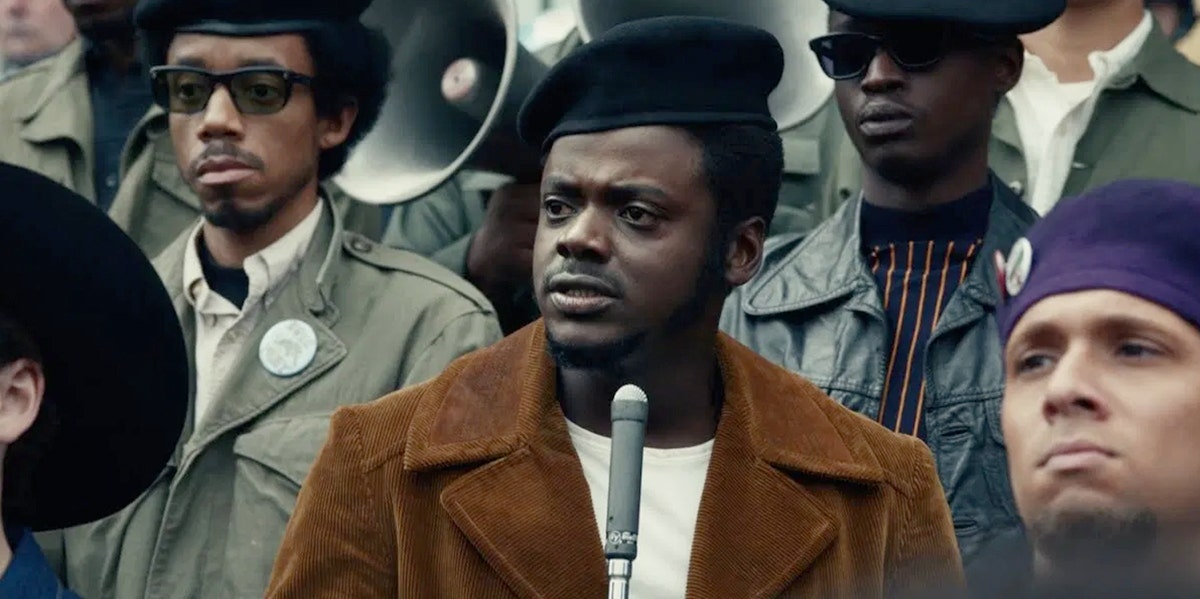Watching 'Judas And The Black Messiah' Made Me Realize How Little Black History We Teach In Schools
Black history is America's history.
 Warner Bros
Warner Bros Judas and the Black Messiah is a powerful film — and an important one.
Released on February 12th on HBO Max, the film follows the last few months of Chairman Fred Hampton’s life of the Illinois Black Panther Party. But more importantly, it shows the infiltration of the FBI, by FBI informant William O’Neal, who was offered a plea deal to get close to Hampton and gather intelligence on him.
Prior to the release of the film, I knew a little about Fred Hampton and his untimely demise at the age of 21. I also knew a little about William O’Neal and the unfortunate life path that led him to be practically coerced and used by the FBI so he could avoid jail time.
But I didn’t know enough. And I didn’t know enough because I was never taught about Fred Hampton, or really about the Black Panthers at all, when I was in public school.
I think the first time I heard about the Black Panthers was when I was 15 and in my junior year of high school. But even then, information was limited.
After finishing the film Judas and the Black Messiah, I was left with questions, mostly about the American educational system. Specifically: Why are U.S. public schools not educating students about Black History to its full extent?
“The Black Panthers are the single greatest threat to our national security. Our counterintelligence program must prevent the rise of a Black messiah from among their midst,” were the words of FBI director J. Edgar Hoover.
Hoover's words, in and of them themselves, many hint as to why many people, Black and white, have never truly learned about the Black Panther Party.
In their time, the Black Panther Party was regarded as an organization very similar to the KKK, especially by many white people within the justice system, like Hoover.
People like Fred Hampton, Angela Davis, Huey P. Newton, Assata Shakur, and even Malcolm X were labeled as terrorists — they were seen as threats to America’s national security. And most, if not all, of them were put on a hit list and many were murdered by the FBI and police.
That's our country's history. Because Black History is also America’s history.
No one is doing anyone any favors by sugarcoating or keeping out certain moments in history that were impactful and important.
I went to a predominantly Black high school, and a lot of Black history was taught to me, which I’m extremely thankful for, though I often wish I was taught more.
But I talk to some of my other Black friends who weren’t afforded that same luxury, who went to predominantly white schools, and I wonder why they weren’t taught the same information.
Why is slavery limited to one chapter? Why are historic figures like Harriet Tubman, Malcolm X, and even people like Angela Davis, and Assata Shakur, not talked about extensively in history classes?
Why is it that we spend months talking about WW1 and WW2, and months talking about European history, but we only spend a few hours on Africa and on Civil Rights?
Movies like Judas and the Black Messiah, The Hate U Give, Fruitvale Station, Selma, and 13th, should be required viewing for all Americans.
Books like The Autobiography of Malcolm X, Seize The Time: The Story of the Black Panther Party and Huey P. Newton, and Are Prisons Obsolete?, should be put in the public school curriculum all across America.
And Black empowerment experts like Keith Dent agree.
"Learning about Black history in totality will help us really know and understand ourselves, not just the bad, which we want to deny, or move on from, but also the good. Carter G. Woodson said in his Negro History Bulletin that, 'A thorough study of the past as it concerns the present helps us to get rid of the falsehood as propaganda which we have ignorantly considered to be history,'" Dent says.
"When more of us know our true history we can embrace not only the story of Fred Hampton, but also the story of William O’Neal because they both represent the good and bad in all of us," Dent continues.
Life coach Charles Eduardos agrees. "What would happen if we ended segregation in the teaching of history and just teach American history in-depth and in its totality, the good, the bad and the ugly? What would happen if we as American people in our beautiful diversity, really take responsibility, individually and collectively, for our actions?" Eduardo says.
"Maybe we can't undo the past. [But] we certainly can choose to create a brighter and better future together celebrating our diversity and honoring our varied traditions and cultures, truly loving and respecting all of humanity. Wilhelm Hegel said, 'the only thing we learn from history is that we learn nothing from history' — we can choose to prove him wrong."
People talk about living in a post-racial society, but we cannot even begin to think about that if the majority of white America isn’t familiar with its horrid and brutal past.
Because I’ll say it again: Black History is America’s History.
Nia Tipton is a writer living in Chicago. She covers pop culture, social justice issues, and trending topics. Follow her on Instagram.

